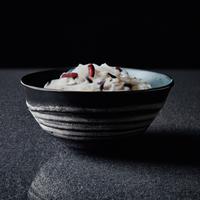
1 serving (158 grams) contains 205 calories, 4.3 grams of protein, 0.4 grams of fat, and 45.0 grams of carbohydrates.

Log this food in SnapCalorie

Nutrition Information
Calories |
205.0 | ||
|---|---|---|---|
% Daily Value* |
|||
| Total Fat | 0.4 g | 0% | |
| Saturated Fat | 0.1 g | 0% | |
| Polyunsaturated Fat | 0 g | ||
| Cholesterol | 0 mg | 0% | |
| Sodium | 1 mg | 0% | |
| Total Carbohydrates | 45 g | 16% | |
| Dietary Fiber | 0.6 g | 2% | |
| Sugars | 0.1 g | ||
| protein | 4.3 g | 8% | |
| Vitamin D | 0 mcg | 0% | |
| Calcium | 16 mg | 1% | |
| Iron | 1.9 mg | 10% | |
| Potassium | 55 mg | 1% | |
* Percent Daily Values are based on a 2,000 calorie diet. Your daily values may be higher or lower depending on your calorie needs.
Food Attributes
Source of Calories
About Cup of rice
A cup of cooked rice is a staple food enjoyed in various cuisines worldwide, including Asian, African, and Latin American dishes. Typically prepared from white or brown rice, the nutritional profile can vary. White rice is a refined grain, offering a quick source of carbohydrates and energy, though it lacks fiber and some nutrients lost during processing. Brown rice, on the other hand, is a whole grain, rich in fiber, B vitamins, magnesium, and antioxidants, making it a healthier alternative for heart health and digestion. Rice is naturally gluten-free, making it a suitable option for those with gluten sensitivities. While beneficial in moderation, excessive portions may contribute to blood sugar spikes, particularly with white rice due to its higher glycemic index. Pairing rice with proteins, vegetables, and healthy fats can create a balanced, nutritious meal suitable for a variety of dietary needs.



